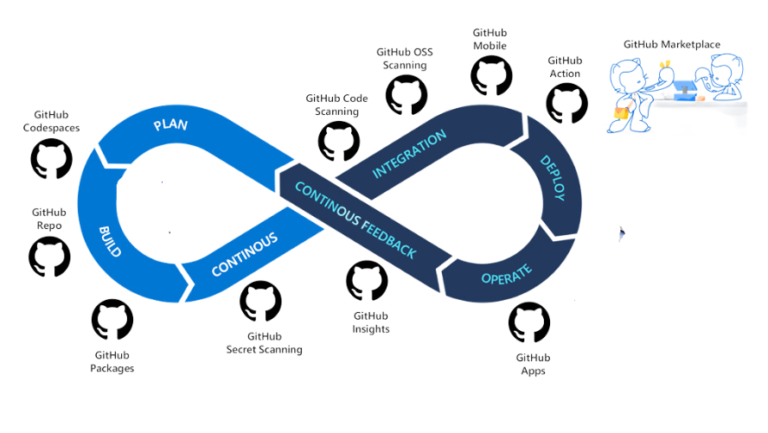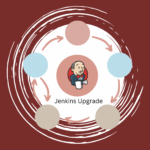Imagine having a magic toolbox where every tool you could ever need is neatly organized for your next big project. That’s GitHub for you—a dynamic ecosystem built not just for developers but also for curious learners and professionals from all fields. Let’s dive deep into each tool and explore real-world examples that illustrate their power.
The Heart of GitHub: A Comprehensive Overview
GitHub isn’t just a place to store code; it’s a full-fledged workshop offering a range of tools that simplify collaboration, automation, and deployment. Picture it as your modern workshop where every tool—from power tools to smart gadgets—is at your fingertips.
Here is GitHub’s comprehensive ecosystem
- GitHub.com: The central platform where code is hosted and collaboration happens.
- GitHub Enterprise: The fortified headquarters offering robust security and scalability for organizations.
- GitHub Actions: The automation factory streamlining CI/CD workflows with precision.
- GitHub Packages: The dependable depot for managing and hosting software packages.
- GitHub Codespaces: Futuristic cloud-based workspaces that bring development to the next level.
- GitHub Copilot: Your AI-powered co-pilot, guiding and enhancing the coding experience.
- GitHub Issues: The meticulous tracker ensuring every bug and feature request is managed.
- GitHub Discussions: The community forum where ideas, insights, and solutions come to life.
- GitHub Projects: The command center for organizing tasks and tracking project progress.
- GitHub Wiki: A dynamic, living document repository for collaborative knowledge sharing.
- GitHub Pages: The creative space for hosting static websites with style.
- GitHub Security: A vigilant guardian employing advanced security measures like secret scanning and dependency review.
- GitHub Sponsors: The platform championing open source, connecting supporters with creators.
- GitHub CLI: A powerful command-line toolkit for swift, efficient interactions.
- GitHub Desktop: A streamlined desktop application simplifying local repository management.
- GitHub Marketplace: An integration hub where third-party apps and actions extend GitHub’s functionality.
- GitHub Insights: The analytics center providing data-driven insights to drive informed decisions.
- GitHub Learning Lab: An interactive platform nurturing developer skills through guided tutorials.
- GitHub Classroom: The educational branch designed to empower educators and learners.
- GitHub Next: The innovation lab exploring tomorrow’s development paradigms today.
Let us focus on those critical ones:
1. Repositories: Your Digital Workshop
What It Is:
Repositories are like digital filing cabinets or workshops where you store and manage your projects.
Imagine you’re building a website. You create a repository called my-awesome-site where you save HTML, CSS, and JavaScript files. Every time you add a new feature, you commit your changes. Version control ensures you can always go back if something breaks.
2. GitHub Actions: Automate Your Workflow
GitHub Actions is an automation tool that acts like an assembly line, handling repetitive tasks such as testing code, building projects, and deploying applications.
Suppose you want your code to be tested every time you push changes. With GitHub Actions, you can set up a workflow:
3. GitHub Pages: Your Creative Exhibition Space
GitHub Pages lets you turn a repository into a live website with just a few clicks.
If you have a portfolio repository called my-portfolio, you can easily publish it as a website. Just push your code to a branch named gh-pages, and GitHub automatically serves your content.
You might use Jekyll or another static site generator to streamline this process. It is like creating a digital photo album—where your work is displayed online for everyone to see.
4. GitHub Issues & Discussions: The Digital Roundtable
Issues and Discussions are GitHub’s built-in ways to track tasks, report bugs, and brainstorm ideas.
Imagine a team working on a mobile app. A bug is discovered, so a team member opens an issue with details and screenshots. Others can comment, suggest fixes, and track progress—all within the same thread.
These tools integrate with your codebase, allowing seamless linking of commits to issues.Think of it as a digital whiteboard or meeting room where everyone can share ideas and solve problems collaboratively.
5. GitHub Copilot: Your AI-Powered Coding Buddy
GitHub Copilot uses AI to suggest code snippets and help you write code more efficiently—almost like having a seasoned mentor right beside you.
While coding in Visual Studio Code, you start typing a function to sort an array. Copilot offers a complete function suggestion based on best practices, which you can tweak as needed.
It accelerates the coding process and reduces the need to search for common code patterns. Imagine a smart friend who gives you hints and examples while you learn a new language, this tool makes learning code simpler.
Keywords naturally integrated: If you’re exploring AI for beginners or delving into machine learning applications, GitHub Copilot is a practical tool to enhance your coding journey.
6. GitHub Packages: Your Centralized Library Manager
GitHub Packages is a package hosting service that lets you manage dependencies and share libraries across projects.
Say you develop a custom JavaScript library. By publishing it to GitHub Packages, other developers can easily integrate it into their projects using a simple dependency manager like npm.
This central repository simplifies dependency management, ensuring consistency across projects.Imagine a well-stocked pantry where you can access all your favorite ingredients in one place.
7. GitHub Codespaces: Your Portable Development Environment
GitHub Codespaces provides a full-featured, cloud-powered development environment that you can access from anywhere.
Need to debug an issue on a project but away from your primary workstation? Launch a Codespace directly from your repository, and start coding in an environment pre-configured with all your project dependencies.
It eliminates the hassle of local environment setups, making collaboration and remote work more efficient. Think of it as a portable studio that you can set up anywhere—be it at home or a coffee shop.
8. GitHub Marketplace: Extend Your Ecosystem
The GitHub Marketplace offers a range of integrations and apps to further enhance your workflow, from security scanners to code review tools.
Integrate a security tool from the Marketplace that automatically scans your repository for vulnerabilities every time you push new code.
These integrations can plug right into your existing workflows, saving time and improving efficiency.It’s like an app store for your projects—adding functionality with just a few clicks.
Bringing It All Together: Why This Matters
GitHub offers a fascinating glimpse into the world of software development—explained through everyday analogies like workshops, filing cabinets, and digital roundtables.
FAQs
Q: What is a repository?
A: It’s like a digital workshop where you store, organize, and manage your project files.Q: How do GitHub Actions help?
A: They automate repetitive tasks, much like a smart assistant handling your daily chores.Q: Who can benefit from GitHub Copilot?
A: Both beginners and seasoned coders. It offers real-time suggestions to help write efficient and clean code.Q: What makes GitHub Codespaces unique?
A: It provides a fully configured, cloud-based development environment accessible from anywhere—like carrying your studio in your pocket.
Final Thoughts
GitHub’s ecosystem is a versatile toolkit that goes beyond code hosting. it is a collaborative, automated, and expansive platform for building and sharing projects. Whether you’re a developer refining your code or someone exploring the digital realm, these tools simplify complex processes into everyday tasks.
Need assistance to migrate your existing DevOps Tool chain to GitHub? We’re here to help—contact us!


